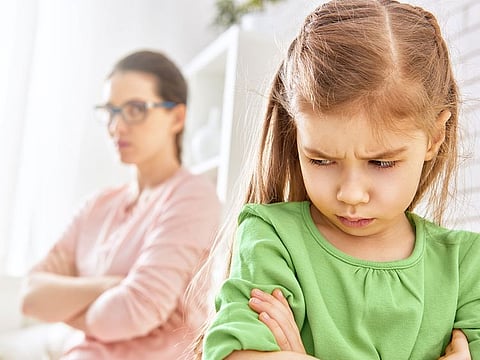COVID-19 divided families reunite in the UAE – so why are the kids fighting?
Children may be acting out because of a fear of abandonment

Before I shuttled colleges and moved to the UAE, I spent a month juggling all the agitation that comes from living alone in India’s capital, New Delhi; battling cash constraints and bank red tape, navigating transport and the unruly characters in public mediums, and tackling other ‘grown-up’ issues. When my mum returned to help me move, the initial days were fraught with anger and head-butting; common questions such as ‘where are you going?’ felt intrusive and refrains of ‘get home on time’ felt unfair. Looking back, it was my defence mechanism acting up and my overwhelmed heart that could not believe its good fortune; I could go back to being a kid and not stressing about the big stuff.
When the pandemic kicked in last year, the restrictions – some self-imposed and others state mandated – meant families had to stay away from each other; parents have been in one part of the world while children have been in another. As vaccinations become more and more common some gateways to home have opened up and reunions are once again on the cards.
But for those who are just getting back to their families, once you get past the happiness some new issues may crop up. We asked the experts how to navigate the new rocky roads of a reunion and what may become your family’s new normal.
Anthony Sibusiso Nhlapo, Clinical Psychologist at Openminds Psychiatry: Counselling and Neuroscience Center, says: “The unplanned and protracted travel [restriction] forces children to learn to live without the separated parent. As a result, they may change or adjust rules, pick on new undesirable habits and even develop resentment towards the parent for ‘abandoning them’.”
The unplanned and protracted travel [restriction] forces children to learn to live without the separated parent. As a result...[they may] develop resentment towards the parent for ‘abandoning them’.”
New rules, new ways
“So, the sudden return of the separated parent after a long, although definitely longed [for] by the child, may create emotional problems for the child and result in adjustment problems. For example, children may find it difficult to return to pre-travel family conditions and may want to continue with their learned and adapted behaviors following the separation. The child may want to wake, eat, play and sleep at times that are unfamiliar to the separated parent. This can cause clashes if the separated parent reinforces the old rules without renegotiating them with the child,” he adds.
Sneha John, Clinical Psychologist, Camali Clinic, Child & Adult Mental Health, also speaks of a fear of ‘re-abandon’. “Children are unsure what to expect from a returning parent. For example, they may fear they will be punished for six months’ of bad behaviour. They may also fear you will leave them again. Remember that change is just as stressful for children as it is for adults – probably more so because they have so little experience coping with it. Sometimes they act out,” she explains.
Different ages, different reactions
Sneha John, Clinical Psychologist, Camali Clinic, Child & Adult Mental Health, explains that it’s normal for children to be excited and yet a little resentful when they physically reconnect with their parents. “Infants may cry, fuss and pull away from the returning parent, toddlers may not even recognise the parent or have temper tantrums or regress to earlier behaviours, and preschoolers may have intense anger, act out or be overly demanding. At school age, children may want to talk to or be with the returning parent constantly or feel guilty that they caused the separation or didn't measure up while the parent was gone. Teens may emotionally distance themselves from the returning parent and worry about changes in rules and standards as well as feel guilty.”
What are the signs that something is wrong?
While parents know their kids best, here are some general signs to watch out for that point to your child being overwhelmed with your return. Sibusiso Nhlapo points to:
Reintegrating peacefully
Change is difficult, especially for children who thrive when in a routine and get disturbed when thrown out of it. Here are some remedial measures as suggested by Sibusiso Nhlapo:
John recommends the following:
There’s a lesson to be learned
Geeta Ramakrishnan, Wellness and Ontological Coach, says that the separation parents and kids might have endured comes with a lesson that’s ripe for the teaching. She says: “COVID offers all of us unchartered challenges. The separation from known environment with the added uncertainty being one of them. Parents can explain to the kids to treat the extended stay [abroad] as a learning experience and opportunity to understand how privileged the kids are here in UAE.” “Parents must explain [to] kids how people live in different circumstances and tell them that money and luxury is not equal to happiness. Happiness can be found in small pleasures and corners of life. It helps the children expand their perception.”
It took about a week of arguments and miserable, awkward interactions for things to get back to normal between my mum and me. I had resented her travels and suffered her absence. But reunited, gradually the anger faded leaving behind the usual: lots of love.
Are you facing any parenting issues that you'd to talk about? Write in to us at parenting@gulfnews.com
Sign up for the Daily Briefing
Get the latest news and updates straight to your inbox









